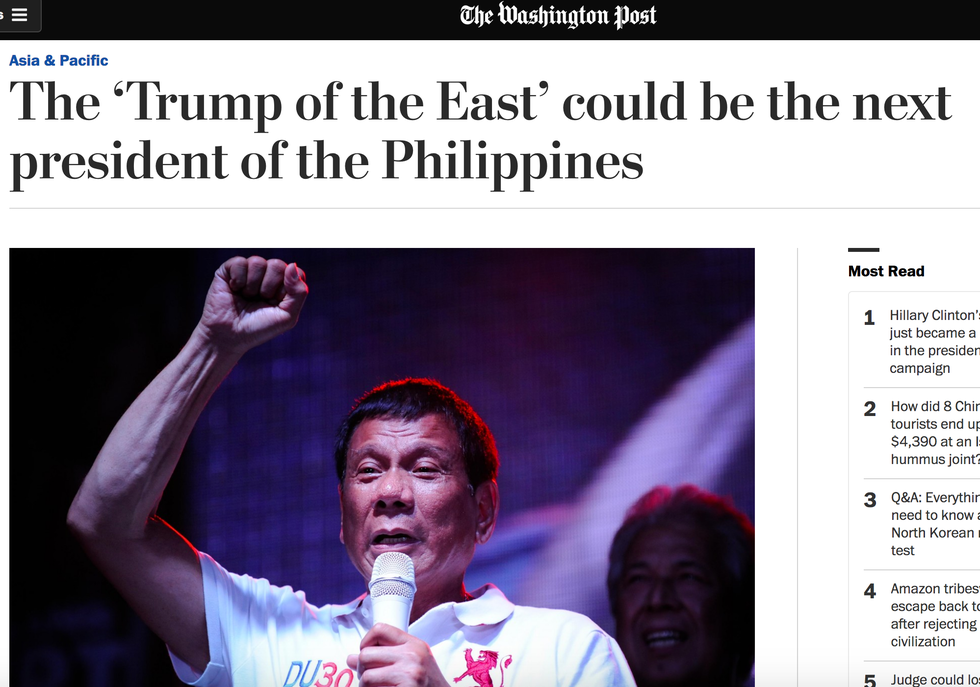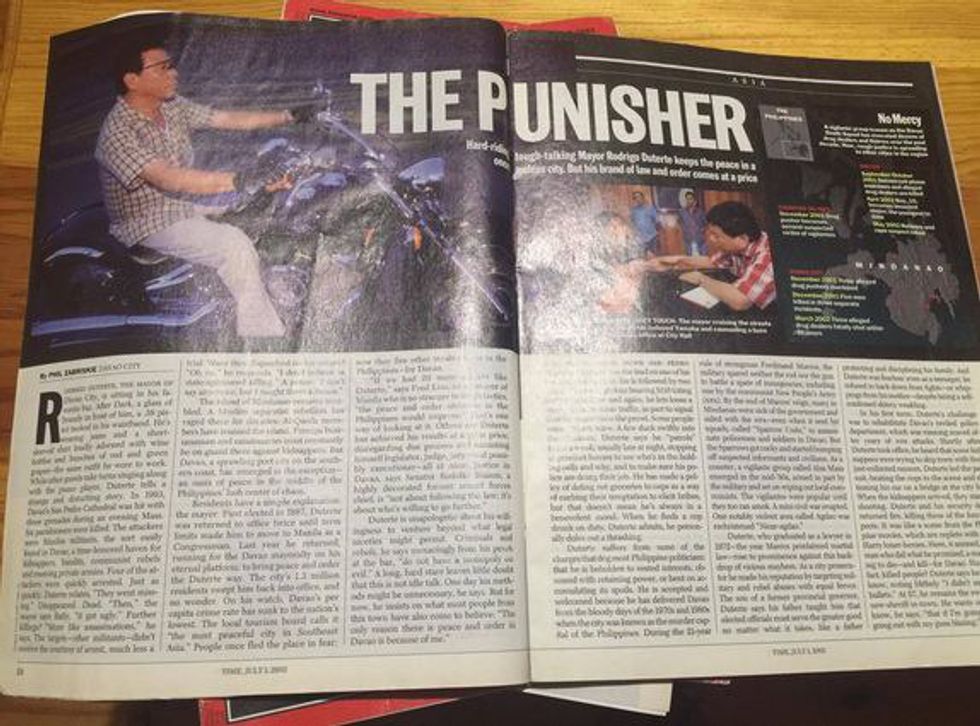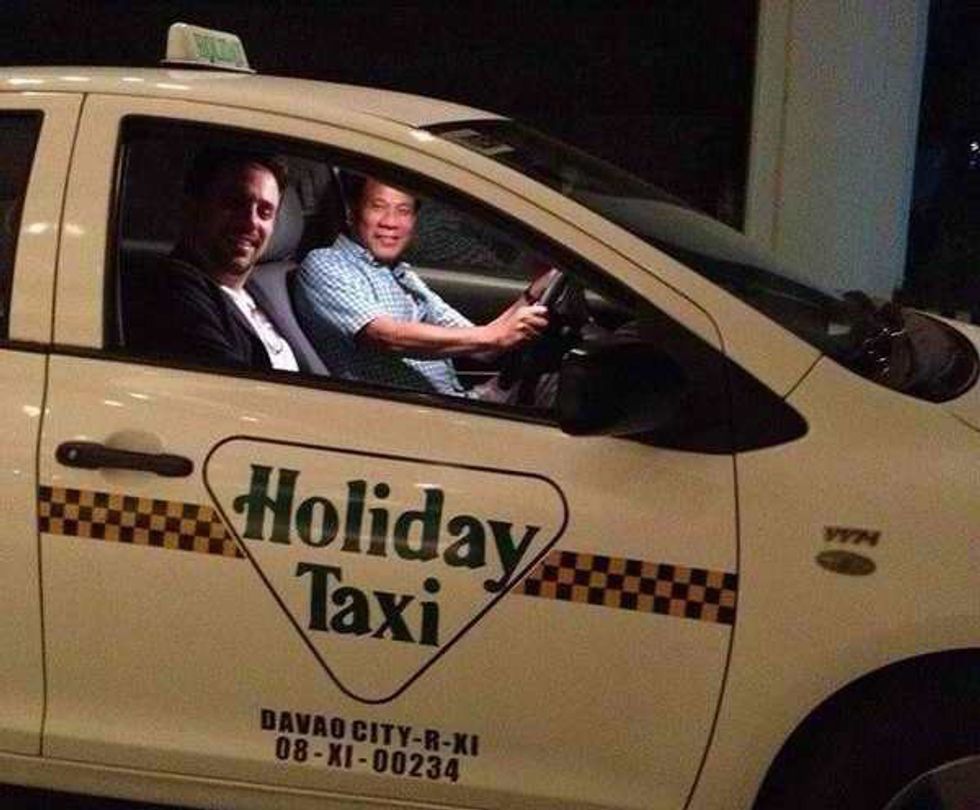Obviously, many people have different opinions on the new President of the Philippines. However, some are quick to judge on his antics and often label him as a dangerous man without knowing the background story. Yes, his behavior is erratic, but don't fall under media spin. As a Filipino-American, I think I need to address the misconceptions and such.
On June 30, 2016, Former Mayor of Davao City, Rodrigo Duterte, took office of Presidency in the Philippines. More than 16 million Filipinos cast their vote on him, mainly because they are fed up with the country’s direction. They believed that President Duterte has the toughness and behavior to get the job done and go beyond. The reason for this is because of the corruption and failures from the last three presidents that had driven the country into an embarrassing state.
The Last Three Presidents Before President Duterte.
13th President of the Philippines, Joseph Estrada, is a controversial figure. It is practically straight out of a drama (I’ve watched too many Korean dramas). He gained popularity as a film actor, starring over hundreds of films during the span of 30+ years. After that, he used that popularity to become a politician and served as a mayor, senator, and vice-president. He made his mark by running for presidency in 1998 and won the election. As president, he declared an “all-out war” on Moro Islamic Liberation Front, a Filipino-fighting secessionist group who seeks independence for the Moro and Muslim Filipinos from the main government. Estrada’s presidency was able to capture many headquarters and bases. However, corruption allegations weighed in on the president, and eventually revealed that he had stolen and embezzled $80 million in less than three years of his presidency. His allies and cabinet members turned against him, including his Vice President. He faced an impeachment trial, and he was forced to resign (he was ousted by the people) in 2001. He was convicted of corruption charges and was sentenced to life in prison; however, his former Vice-President-Turned-President later pardoned him. He actually ran an unsuccessful presidential run in 2010, and is currently the Mayor of Manila, the country’s capital, since 2013. What the hell?
Gloria Macapagal Arroyo became the 14th President of the Philippines in 2001 after President Joseph Estrada was ousted. She served as the Vice President under his presidency. As mentioned before, she pardoned him for his corruption crimes. President Arroyo was no stranger to presidency. She was the daughter of Diosdado Macapagal, who served as the ninth President of the Philippines. Under her presidency, there were improvements to the economy and to roads and infrastructure. However, she was marred by controversy. In 2003, a mutiny occurred by soldiers to demonstrate to the people that the president was corrupted and was ready to call for martial law. She ran a successful re-election in 2004. Conversely, she was accused of cheating, electoral fraud and rigging. This scandal became known as “Hello Garci,” which involved recordings of the President declaring the rigging for her favor. President Arroyo acknowledged that it was her voice and issued an apology. However, she denied and believed it did not change any outcome of the election. She refused to resign and faced many impeachment attempts, but to no avail. In 2006, she declared a state of emergency after an alleged coup d’état was taking place. After it was uplifted, many believed the situation was an overkill because the group was completely small, and she did it to regain political power. Despite the scandals, because she was formerly a professor of economics, the economy improved, and the currency strengthened heavily. After her presidency ended, she faced numerous of charges of corruption and electoral fraud and was arrested. However, she was acquitted by the Supreme Court.
Benigno “Noynoy” Aquino III became the 15th President of the Philippines on June 30, 2010. Throughout the modern history of the country, the Aquinos have been one of the most, if not the most, powerful and influential political family.
His father Benigno “Ninoy” Aquino Jr. was one of the most influential leaders against his good friend and political rival, 10th President (and Dictator) of the Philippines, Ferdinand Marcos, and his martial law. Upon the effect of martial law, he was arrested and incarcerated for years until in 1980, Marcos’s wife allowed him to get medical treatment in the United States following a heart attack. Hearing that Marcos’s health was declining, he returned to the Philippines in efforts to have peaceful talks with him, despite his opponents and allies declaring it is too dangerous. In his last interview before returning, he told the journalists, “You would have to be very ready with your hand camera because this action can become very fast. In a matter of 3 or 4 minutes, it could be all over, and I may not be able to talk to you again after this.” On August 21st 1983, in broad daylight, he was shot in the head, point blank, on the ground floor of the airport. This situation sparked allegations that the Marcos killed him, but there was no evidence. This prompted a revolution that led Ninoy’s wife, Corazon Aquino, into becoming a leading figure and eventually, becoming the 11th President.
The Aquino history definitely played a part of President Noynoy’s successful election. His presidency oversaw numerous changes in the education system and the economy. However, his handling and implements on these changes were poor. Originally, the Philippines had elementary schools that go up to grade six, then high school. He modeled the K-12 program; however, those extra two years discouraged some high school teachers. In other words, ninth grade and 10th grade were in a way empty, and teachers had to wait for two more years for students to graduate to high school. The traffic in Metro Manila increased heavily. To sum it all up, all of his promises were empty and had lack of progress. His lack of leadership during the aftermath of Typhoon Haiyan back in 2013 proved that he is incapable of improvements for the people. Two to three years later during his office, little progress has been made. He was one of the subjects during the pork barrel fund scandal. He became a controversial figure when 44 Special Action Force were ambushed and massacred after a successful yet, botched neutralization of a target. It showed lack of preparedness as a leader. When he left the presidency, he was not an impacting president. He was not bad nor good, but in a way, he was incompetent. He managed to keep the economy stable, but in terms of major changes, nothing much happened. In honestly, I couldn’t write much about him because he did not do much in six years. In a way, it correlates with the frustration of many Filipinos.
President Duterte's Accomplishments as Mayor of Davao City.
This frustration was transferred into votes for a new leader who can get the job done. Former Mayor of Davao City, Rodrigo Duterte, is the most popular politician in the Philippines even before his presidential bid. He has been in office for more than 30 years and is known to be a tough and powerful man.
Many people, mostly Americans and the media, often label him as the bad guy. He has made controversial statements that many people, including myself, find disgusting. He recently made headlines from the media claiming he had cursed out President Barack Obama. Others believed he was mistranslated or that he was not referring to the US President (scroll down for analysis and my opinion). However, regardless of what he said, many Filipinos know him for having a tough mouth. President Obama acknowledged this saying that for him, it is “a habit, a way for speaking for him.” It should not be taken too personally as he often curses, even though it is still a bad habit as a leader. Despite this, the media makes him look like a bad guy because of his statements, and people are quick to judge. In his 30+ years in politics, he has proven that his actions are much more powerful than words. Here is a summary of his actions as mayor in no particular order.
During his mayor years, he has aided in assistance and efforts to give help to Typhoon Haiyan victims in 2013. He is known for his extra-judicial killings of drug dealers and users; however, he had used funds to build 24-hour drug rehabs and treatments for drug users, and he offered allowances to drug users who choose to get help, as he believes they can change. He often visits the New People’s Army camps, who are labelled as terrorist groups, for diplomacy and peace talks. He is supported by the indigenous people and Muslims for allowing their voices and interests be heard through deputy mayors. He is known for implementing anti-smoking campaigns and time limits on alcohol selling, buying, and consumption. At the same time, he supports the usage of medical marijuana. Believe it or not, he is a strong supporter of the LGBT+ rights and Women’s Right in the Philippines and even banned swimsuit competitions in his hometown. Despite his “womanizer” ways and that controversial remark, he separates his behavior and politics, which is a bit confusing. His extra-judicial killings and death squads allowed Davao City’s crime rate to decreased dramatically while population rose. Often criticized for Human Rights violations outside of the Philippines, citizens inside are supportive of his decisions. He is nicknamed, “The Punisher” by Times magazine. On a lighthearted note, local news articles have reported that he sometimes poses as a taxi driver as a way of patrolling the streets.
What President Duterte Has Done During His 70+ Days in Office.
As of September, it has not been even 100 days yet, and he has made so much progress in the country.
Hour after his inauguration, he held his first Cabinet meeting to talk about the disaster risk reduction and the establishment of a 24-hour complaint office. Thousands of drug users/addicts surrendered for rehabilitation. He issued his first executive order on July 4th that focused anti-poverty and housing programs. On July 5th, he named five top police officials who are allegedly linked with the drug lords and trades as protectors. He is involved with peace talks and ceasefires with the Moro National Liberation Front and other Moro groups. He has met with high-ranking diplomats and Secretary of State, John Kerry, to discuss relations with the United States and the ongoing conflict with territorial disputes around the South China Sea. He has made efforts to help the OFW (Overseas Filipino Workers) stranded in other countries. As a result, the crime rate in July was down by 31% compared to last year, and his trust approval rate was 91%. On August 7, 2016, President Duterte revealed the names of more than 150 public officials, politicians, judges, and police officials in his "I am sorry for my country" speech. Throughout the months, he is slowly shifting the country towards Federalism as he believes it will spread development throughout.
Here's a 40+ minute video of the speech.
Are His Extra-Judicial Killings Justified? My Thoughts.
Of course, he has been criticized for his extra-judicial killings as it violates human rights. However, if you think about how the Philippines was run prior to Duterte's presidency, it is a safe haven for drug lords. Belief or not, it is common to think that politicians and officials have ties to drug lords because they get some sort of profit and benefits for protecting them. Think of Pablo Escobar. He had connections. President Duterte believes that most of the corruption happening in the country ties to drug trades. A simple connection would be politicians protect drug lords, they receive profit from them, profits turn into bribes, bribes turn into votes, and the cycle continues. Simple corruption and power. At the same time, people are suffering from drugs (obviously hard drugs like cocaine or meth). He has strongly emphasized that drug addicts and users should surrender and go to rehab for improvement. As stated before, many people have surrendered. China is also helping Philippines build more rehab centers. While I agree that this extra-judicial killings are a violation of human rights, the effects have proven to be lower crime rate, trust in the president, and progress. I have met many Filipinos who support President Duterte's direction from Filipino Americans to Filipinos.
Did President Duterte Really Curse at President Obama?
Now let me take this opportunity, and let's analyze the controversial headline when President Duterte cursed out President Obama. The transcript is here.
"We have long ceased to be a colony of the United States." - Philippines was colonized under USA until July 4, 1946.
Alam mo, marami diyan, sa mga kolumnista (You know, many of the columnists), they look upon Obama and the United States as if we are the lap dogs of this country. I do not respond to anybody but to the people of the Republic of the Philippines. Wala akong pakialam sa kanya (I don't care about him). Who is he? - The United States are often looked upon as the leader of the world or somewhere along the lines. Another way of saying that is that they are the police country of the world. If United States does not like something, they act like they are right. It is a bit ironic because sometimes the government does not listen to us citizens.
I am not beholden to anybody. Iyong mga kolumnista diyan na (Those columnists who say), "Wait until he meets – " Who is he? I am a President of the sovereign state, and we have long ceased to be a colony. I do not have any master, except the Filipino people. Nobody but nobody. - The last part was a powerful statement. His love for his country is strong. President Duterte believes that his direction is right, the people are the proof, and that he will serve for the interest of his people, and not because another country said this or that. Nationalism.
You must be respectful. Do not just throw away questions and statements. Putang-ina, mumurahin kita diyan sa forum na iyan. Huwag mo akong ganunin (Son of a whore, I'll curse you at that forum. Don't do anything like that to me). Tell that to everybody. Itong mga kolumnista, para ba akong tinatakot. Anak ka ng – umalis kayo diyan sa Pilipinas, pumunta kayo doon sa Amerika (These columnists, it's like they're threatening me. Son of a – leave the Philippines, go to America). - The "son of a bitch" statement was definitely not directed at him. You know why? Because he says this out of frustration. He is known by Filipinos to say "Putang-ina" a lot. If you search "Duterte Putang Ina" on YouTube or Google, you would see a bunch of results of him cursing. We all curse something offensive without directing at someone. For example, when you stub your toe, you would most like yell, "Fuck" or "Shit." Others would yell, "Son of a Bitch." It is a form of expression for President Duterte because he was mad. There are a handful of Filipinos that use the expression as "Fuck," rather than, "Son of a Bitch." When my parents say that, I often think of "Shit," but the literal meaning is "Son of a Bitch."
Nobody but nobody can just – sino ka (who are you)? Iyong mga American-Indian sa sine lang inubos mo eh (You annihilated the American-Indians). What about the rights of those guys who died in the past? Is it because it’s just the past tense we do not answer for the present tense? You must be kidding. Stop joking yourself. Kayong mga sobra kabilib diyan (Those of you who are so impressed) – who is Obama to ask me that? I’ll tell him, "Who are you?" Tell him that. Telegraph mo ngayon (it now). Hindi ako – punta dito, magpaka-ulila diyan sa mga –
- He addressed the hypocrisy of the United States in terms of human rights. He remembers how the United States treated the Native Americans poorly. He also hints how people of color are treated horribly. In other words, he is asking why United States should lecture and address him about human rights when United States itself is treating its citizens poorly.
I just wanted to get it off my chest. People should not underestimate him. He has proven to be capable and strong. The Philippines needs President Duterte.
























